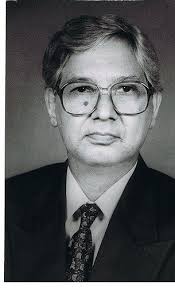 Shahryar
Shahryar
(Shahryār)
(Ak̲h̲lāq Muḥammad K̲h̲ān; 1936-2012)
 Shahryar
ShahryarShahryar (Shahryār; 1936-2012) was born Kunwar Akhlaq Mohammed Khan (Ak̲h̲lāq Muḥammad K̲h̲ān) in Aonla, Bareilly, in what is today Uttar Pradesh. His father was a policeman and wanted his son to be one too. He ran away from home to eventually become one of Urdu literature’s preeminent modern poets.
In 1966 he started as a lecturer in Urdu at Aligarh Muslim University, where he received his M.A. and, later, his Ph.D. under the supervision of poet-critic Khalilur Rahman Azmi (1927-78). He was eventually named Professor in 1986 and then head of the department, retiring in 1996. He took a periodic leave from academia to go to Mumbai and the film world where he became a highly successful film lyricist, writing notable lyrics for five films, the most acclaimed one of which was the much-praised Umrā‘o Jān (1981). Returning to teaching, he refused other highly lucrative offers to write film lyrics, saying he did not want to become a “song shop.”
He was the author of five volumes of modernist poetry: Ism-i aʻẓam (Name of the Greatest [God]; 1965), Sātvān dār (Seventh Door; 1969), Hijr ke mausam (Seasons of Separation; 1978), Khvāb kā dar band hai (Door to Dreams Is Closed; 1985), for which he received the 1987 Urdu Sahitya Akademi Award, Nīnd kī kircen (Shards of Sleep; 1995), and Shām hone wālī hai (Evening Is Coming; 2004). He also received the prestigious Jnanpith Bharatiya Award in 2008. Many of his poems center around the tropes of sleep, dreams, dream-states, and the liminal areas between consciousness and sleep, and between sleep and consciousness, where we seem to struggle to solve our problems, yet seem to create others, as in such poems as “Āk̲h̲irī sāns” (Last Breath),* “K̲h̲vāb” (Dream),* “K̲h̲vāb kā bhikārī” (Beggar of Dreams),* and perhaps his most famous poem, “Khvāb kā dar band hai” (Door to Dreams Is Closed).
See “Shahryar, Kunwar Akhlaq Muhammad Khan,” Encyclopaedia of Indian Literature, 5 (1992) 3950-51; Rakhshanda Jalil, “Through the Closed Doorway: Nazms by Shahryar,” India International Centre Quarterly, 28:3 (2001) 109-18; The Light of Dusk: Selected Poems of Shahryar (2003); Through the Closed Doorway: A Collection of Nazms by Shahryar, tr. Rakhshanda Jalil (2004); Selected Poetry of Shahryar, tr. Baidar Bakht and Marie-Anne Erki (2010); Mehr Afshan Farooqi, “Farewell, Shahryar,” Economic and Political Weekly, 47:21 (26 May 2012) 25-27; Humra Quraishi, “Shahryar and Those Sharks,” Indian Literature, 59:6 (2015) 111-14; and Rakhshanda Jalil, Shahryar: A Life in Poetry (2018).
1. Ā’īne dekh ke . . . / Looking in the Mirror . . .
2. Āk̲h̲irī sāns / Last Breath
3. Āk̲h̲ir-i shab / Night’s End
4. Gīt kā janam / Birth of a Song
6.ʻIrfān kī āk̲h̲irī manzil / Last Stage of Gnosis
7. Jurm o sazā / Crime and Punishment
9. K̲h̲vāb kā bhikārī / Beggar of Dreams

